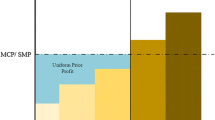Abstract
This paper presents an application of finite n-person non-cooperative game theory for analyzing bidding strategies of generators in a deregulated energy marketplace with Pool Bilateral contracts so as to maximize their net profits. A new methodology to build bidding methodology for generators participating in oligopoly electricity market has been proposed in this paper. It is assumed that each generator bids a supply function. This methodology finds out the coefficients in the supply function of generators in order to maximize benefits in an environment of competing rival bidders. A natural choice for developing strategies is Nash Equilibrium (NE) model incorporating mixed strategies, for solving the bidding problem of electrical market. Associated optimal profits are evaluated for a combination of set of pure strategies of bidding of generators, and payoff matrix has been constructed. The optimal payoff is calculated by using NE. An attempt has also been made to minimize the gap between the optimal payoff and the payoff obtained by a possible mixed strategies combination. The algorithm is coded in MATLAB. A numerical example is used to illustrate the essential features of the approach and the results are proved to be the optimal values.
Similar content being viewed by others
References
K. David, Competitive bidding in electricity supply, in IEE Proceedings of the Generation, Transmission and Distribution (IEEE Xplore, USA, 1993), pp. 421–426
S. Hao, A study of basic bidding strategy in clearing pricing auctions. IEEE Trans. Power Syst. 15, 975–980 (2000)
R.W. Ferrero, J.F. Rivera, Price-taker bidding strategy under price uncertainty. IEEE Trans. Power Syst. 17, 1081–1088 (2002)
A. Saleh, T. Tsuji, T. Oyama, Optimal bidding strategies for generation companies in a day-ahead electricity market with risk management taken into account. Am. J. Eng. Appl. Sci., ISSN 1941-7020,© 2009 Science Publications, 2(1), 8–16, 2009
L. Tao, S. Mohammad, Strategic of transmission constrained Gencos with incomplete information. IEEE Trans. Power Syst. 20, 437–447 (2005)
F. Wen, A.K. David, Optimal bidding strategies and modelling of imperfect information among competitive generators. IEEE Trans. Power Syst. 16(1), 15–21 (2001)
C. Li, A.J. Svoboda, X. Guan, H. Singh, Revenue adequate bidding strategies in competitive electricity markets. IEEE Trans. Power Syst. 14(2), 492–497 (1999)
M. Carrión, A. Conejo, Arroyo journal forward contracting and selling price determination for a retailer. IEEE Trans. Power Syst. 22(4), 2105–2114 (2007)
B.F. Hobbs, B.M. Carolyn, J.S. Pang, Strategic gamming analysis for electric power systems: an MPEC approach. IEEE Trans. Power Syst. 15(2), 638–645 (2000)
B.F. Hobbs, Linear complementarity models of Nash–Cournot competition in bilateral and PoolCo power markets. IEEE Trans. Power Syst. 16(2), 194–202 (2001)
K.H. Lee, R. Baldick, Tuning of discretization in bimatrix game approach to power system market analysis. IEEE Trans. Power Syst. 18(2), 830–836 (2003)
S. Soleymani, A.M. Ranjbar, A.R. Shirani, New approach for strategic bidding of Gencos in energy and spinning reserve markets. Energy Convers. Manag. 48, 2044–2052 (2007)
I. Otero-Novas, C. Meseguer, C. Battle, J.J. Alba, A simulation model for a competitive generation market. IEEE Trans. Power Syst. 15, 250–256 (2000)
R.W. Ferrero, S.M. Shahidehpour, V.C. Ramesh, Transaction analysis in deregulated power systems using game theory. IEEE Trans. Power Syst. 12(3), 1340–1347 (1997)
B. Chatterjee, An optimization formulation to compute Nash Equilibrium in finite games, in International Conference on Methods and Models in Computer Science, (2009) pp. 174–178
Acknowledgments
The author acknowledges the support and encouragement extended to him by his organization. However, the views expressed in this paper are of the author in his individual capacity and not necessarily that of Transmission Corporation of Andhra Pradesh Limited of Andhra Pradesh.
Author information
Authors and Affiliations
Corresponding author
Rights and permissions
About this article
Cite this article
Satyaramesh, P.V. A Bidding Methodology by Nash Equilibrium for Finite Generators Participating in Imperfect Electricity Markets. J. Inst. Eng. India Ser. B 95, 1–14 (2014). https://doi.org/10.1007/s40031-014-0077-0
Received:
Accepted:
Published:
Issue Date:
DOI: https://doi.org/10.1007/s40031-014-0077-0




